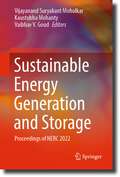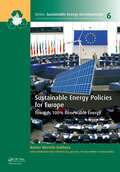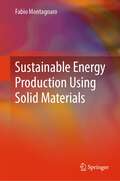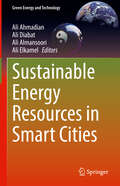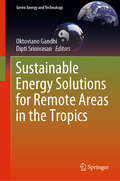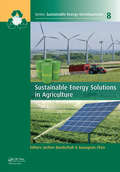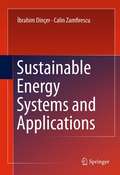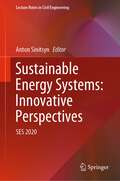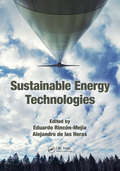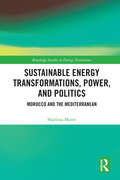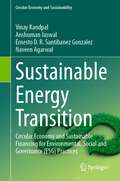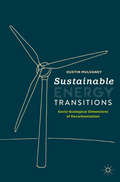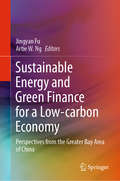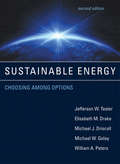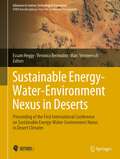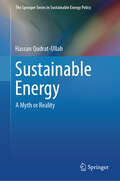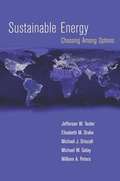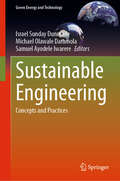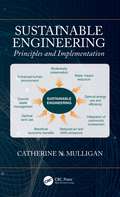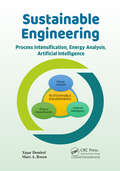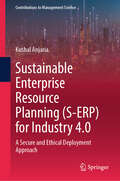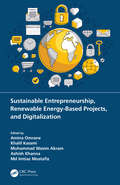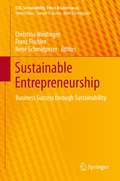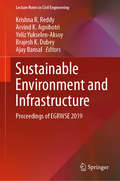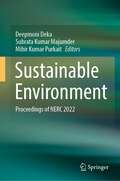- Table View
- List View
Sustainable Energy Generation and Storage: Proceedings of NERC 2022
by Vaibhav V. Goud Vijayanand Suryakant Moholkar Kaustubha MohantyAs India progresses fast in the 21st century, we also face daunting challenges of energy security and climate change. Tremendous development in various sectors like industry, agriculture, transport has resulted in huge rise in demand for energy. Fulfilling these demands through conventional fossil fuel based energy generation has given rise to significant emissions (both gaseous and liquids) that have caused pollution to atmosphere and aquatic eco-systems. Use of sustainable and green (or renewable) resources and technologies offers a viable and promising solutions to these issues. Last two decades have witnessed intense research activities in Indian academic institutions on renewable energy resources. These include biofuels (both liquid and gaseous) through thermochemical and biochemical conversion of biomass, solar energy through thermal and photo-voltaic routes, wind energy and hydroelectric energy. North-East Research Conclave (NERC) – 2022 was organized by Indian Institute of Technology Guwahati with aim of bringing together researchers in diverse fields of science and technology and provide a knowledge-sharing platform to achieve sustainable development goals. This monograph contains papers presented in the session on Sustainable Energy Generation and Storage in NERC. A total of 16 papers in this monograph cover wide areas in renewable energy. The contents of this monograph will of interest to students and researchers in academic institutions as well as industry.
Sustainable Energy Policies for Europe: Towards 100% Renewable Energy (ISSN #6)
by Rainer Hinrichs-RahlwesThe discussion about energy perspectives up to 2050 and beyond has started. There seems to be consensus that ambitious climate change mitigation policies are necessary, whereas proposed solutions vary from aiming at 100% renewable energies and setting up appropriate policy frameworks to a mix of renewables with so-called clean fossil and nuclear energy. Provides an analysis of the different approaches and the reasons why there is no sustainable alternative to aiming at 100% renewables and how this vision could come true. An overview and in-depth analysis of a vital debate, describing policy options and their impact on Renewable Energy development and deployment in Europe.
Sustainable Energy Production Using Solid Materials
by Fabio MontagnaroThis textbook focuses on sustainable energy production using solid materials. With explanatory tables and figures, case studies, worked-out examples, and up-to-date bibliographies of other works, the book provides an in-depth exploration of the most innovative aspects of the field.Readers of the book will gain critical skills in characterizing and reacting to biomass, including the formation of pollutants, as well as using fluidized bed reactors for heterogeneous processes. The book also explores innovative methods for mitigating the greenhouse effect, reusing ashes as adsorbents or in cement production, and thermochemical solar energy storage. This book will give students, novice researchers, and industry professionals valuable insights and knowledge into the sustainable production of energy using solid materials.
Sustainable Energy Resources in Smart Cities (Green Energy and Technology)
by Ali Elkamel Ali Ahmadian Ali Almansoori Ali DiabatThis book offers an extensive examination of the operational and strategic considerations for sustainable energy within the context of smart cities, incorporating cutting-edge advancements in technology, protocols, implementation strategies, and the utilization of energy resources. It examines recent sustainability strategies formulated by various nations emphasizing worldwide application, accompanied by a thorough analysis of economic, technical, and environmental dimensions. The authors present a comprehensive exploration of energy provisioning and administration, underscoring the deployment of data analysis methodologies and tools, such as machine learning and deep learning-based approaches for practical energy management studies. Additionally, it showcases the application of mathematical programming in modeling real-world case studies, leveraging optimization techniques that have broad-reaching global relevance. Presents the latest developments in the application of sustainable energy resources in smart cities; Showcases machine learning and deep learning-based approaches for practical energy management; Includes international case studies.
Sustainable Energy Solutions for Remote Areas in the Tropics (Green Energy and Technology)
by Oktoviano Gandhi Dipti SrinivasanThis book covers multifaceted aspects of sustainable energy solutions for remote areas in the tropics, particularly focusing on Southeast Asia. With insights from both the academic world and real-life implementation, readers will gain an overview of the range of energy problems currently facing the remote tropics, and what potential solutions are available. The book provides a detailed overview of various energy needs in the Southeast Asian tropics, a region where a significant portion of the population still lives without access to electricity. It not only addresses technical solutions to the energy problems but also tackles the social and wider implications, offering readers a more holistic understanding of the potential held by renewable energy. The chapters are structured to present first an overview of the problem at hand, and then a description of the technologies that could potentially solve it. Applications of the technologies; business models that are now available or being developed; the impact of the technologies; and future, more sustainable solutions are all discussed. Given its in-depth analysis, the book will be of interest to energy professionals in the tropics, energy policymakers, and students studying sustainable energy.
Sustainable Energy Solutions in Agriculture (Sustainable Energy Developments)
by Jochen BundschuhSustainability in agriculture and associated primary industries, which are both energy-intensive, is crucial for the development of any country. Increasing scarcity and resulting high fossil fuel prices combined with the need to significantly reduce greenhouse gas emissions, make the improvement of energy efficient farming and increased use of rene
Sustainable Energy Systems and Applications
by Calin Zamfirescu Ibrahim DincerThe concept of sustainable development was first introduced by the Brundtland Commission almost 20 years ago and has received increased attention during the past decade. It is now an essential part of any energy activities. This is a research-based textbook which can be used by senior undergraduate students, graduate students, engineers, practitioners, scientists, researchers in the area of sustainable energy systems and aimed to address some key pillars: better efficiency, better cost effectiveness, better use of energy resources, better environment, better energy security, and better sustainable development. It also includes some cutting-edge topics, such hydrogen and fuel cells, renewable, clean combustion technologies, CO2 abatement technologies, and some potential tools (exergy, constructal theory, etc.) for design, analysis and performance improvement.
Sustainable Energy Systems: SES 2020 (Lecture Notes in Civil Engineering #141)
by Anton SinitsynThis book gathers the latest advances, innovations, and applications in the field of sustainable energy systems, as presented by researchers and engineers at the International Conference Sustainable Energy Systems: Innovative Perspectives (SES), held in Saint-Petersburg, Russia, on October 29-30, 2020. It covers highly diverse topics, including applications of renewable energy sources, recycling of solid municipal and industrial waste, circular economy based on agricultural waste, energy-efficient and sustainable buildings, innovation management and technologies of sustainable cities, sustainable construction, creative construction technology and materials, construction simulation and virtual construction, BIM and rapid prototyping for construction, consumption practices in the digital era, sustainable operations management, and supply chain management in the digital era. The contributions, which were selected by means of a rigorous international peer-review process, highlight numerous exciting ideas that will spur novel research directions and foster multidisciplinary collaborations.
Sustainable Energy Technologies
by Eduardo Rincón-Mejía Alejandro de las HerasThis book examines the key aspects that will define future sustainable energy systems: energy supply, energy storage, security and limited environmental impacts. It clearly explains the need for an integrated engineering approach to sustainable energies, based on mathematical, biogeophysical, and engineering arguments. Resilient and efficient alternatives are compared to non-sustainable options. This book results from the collaboration of 50 international contributors.
Sustainable Energy Transformations, Power and Politics: Morocco and the Mediterranean (Routledge Studies in Energy Transitions)
by Sharlissa MooreThis book analyses energy transitions and the opportunities and challenges for building sustainable energy systems to improve human capabilities while protecting the environment. Sufficient and secure energy supply is critical to human thriving and socioeconomic development. Yet energy systems are also implicated in the most pressing socio-environmental challenges of our time - climate change, air pollution, and water and land use. This book examines what is arguably the most ambitious vision for a renewable energy based system worldwide. This vision, often called Desertec, is for a regional electricity system supplying North Africa, Europe, and the Middle East with sustainable and affordable power. The behemoth plan would entail building dozens of large-scale solar and wind power plants mostly in North Africa, interconnecting the fragmented transmission infrastructure of 38 Mediterranean countries, and linking North Africa to the European Union (EU) through undersea transmission cables. Within the Mediterranean, the book focuses on Morocco, which is one of the most advanced developing countries in renewable energy scale-up, to understand its motivations for building renewable energy and the effects on sustainable development. The book therefore takes a unique multi-scalar approach to understanding the social and political aspects of energy transitions, weaving together the views of villagers living near Morocco’s first solar energy zone with the perspectives of national decision-makers in Morocco with the views of European policymakers and major transnational energy companies in the Mediterranean region. This book will be of great interest to students, scholars and policymakers interested in energy transitions, sustainable and renewable energy, Mediterranean politics, sustainable development and environment and sustainability more generally.
Sustainable Energy Transition: Circular Economy and Sustainable Financing for Environmental, Social and Governance (ESG) Practices (Circular Economy and Sustainability)
by Vinay Kandpal Anshuman Jaswal Ernesto D.R. Santibanez Gonzalez Naveen AgarwalThe book offers a comprehensive overview of the challenges and opportunities associated with the transition to sustainable energy, circular economy, and sustainable financing for ESG practices. The publication is needed at this time because the world is facing urgent environmental and social challenges, such as climate change, resource depletion, and social inequality, which require a fundamental transformation of our economic and social systems. The transition to sustainable energy, circular economy, and sustainable financing for ESG practices offers a promising pathway to address these challenges and achieve sustainable development goals.The purpose of the publication is to provide a holistic and practical guide for policymakers, business leaders, investors, and other stakeholders who are interested in advancing sustainable energy, circular economy, and ESG practices. The book covers a range of topics, including the drivers of the transition, policy frameworks and regulations, technology and innovation, business models and financial instruments, and the role of stakeholders in facilitating the transition. It also emphasizes the importance of integrated approaches that balance economic, social, and environmental objectives, and provides practical examples and case studies of successful sustainable energy, circular economy, and ESG practices from around the world.The new contribution of this publication is its interdisciplinary and practical approach to sustainable energy, circular economy, and ESG practices. The book draws on the latest research from various fields, including economics, engineering, environmental science, and social science, and provides a synthesis of best practices and lessons learned from a diverse range of stakeholders, such as governments, businesses, and civil society organizations. The publication also provides a roadmap for how stakeholders can work together overcome the challenges of the transition and create a more sustainable and equitable future.The book is a timely and essential guide for anyone who is interested in advancing sustainable development goals. The book provides a comprehensive overview of the challenges and opportunities associated with the transition to sustainable energy, circular economy, and sustainable financing for ESG practices and offers practical solutions and case studies from around the world. Its interdisciplinary and practical approach makes it a valuable resource for policymakers, business leaders, investors, and other stakeholders who are committed to creating a more sustainable and equitable future.
Sustainable Energy Transitions: Socio-Ecological Dimensions of Decarbonization
by Dustin MulvaneyThis textbook introduces the key concepts that underpin sustainable energy transitions. Starting with the basic biophysical principles, current sources and environmental consequences of existing energy resource use, the book takes readers through the key questions and topics needed to understand, prescribe, and advocate just and sustainable energy solutions. The interdisciplinary nature of the book aims to build bridges across the social and natural sciences and humanities, bringing together perspectives, ideas and concepts from engineering, economics, and life cycle assessment to sociology, political science, anthropology, policy studies, the humanities, arts, and some interdisciplinary thinkers that defy categories. This accessible approach fills the gap for a textbook that integrates sustainability science and engineering studies with strong empirical social science and it will be a useful tool to anyone interested in the socio-ecological dimensions of energy system transitions.
Sustainable Energy and Green Finance for a Low-carbon Economy: Perspectives from the Greater Bay Area of China (Green Energy And Technology Ser.)
by Jingyan Fu Artie W. NgThe book provides readers with essential insights into key issues in connection with planning, developing and financing sustainable energy projects in China that are relevant for practitioners, investors and developers involved in the emerging sustainable energy sector. It offers readers a deeper understanding of these contemporary issues by drawing on the lessons learned in real-world sustainable energy and green finance development activities in China, which are driven by central planning and policy implementation and complemented by investments and finances from public-private partnerships.
Sustainable Energy, second edition: Choosing Among Options (The\mit Press Ser.)
by Jefferson W. Tester Elisabeth M. Drake Michael J. Driscoll Michael W. Golay William A. PetersThe second edition of a widely used textbook that explores energy resource options and technologies with a view toward achieving sustainability on local, national, and global scales.Human survival depends on a continuing supply of energy, but the need for ever-increasing amounts of it poses a dilemma: How can we find energy sources that are sustainable and ways to convert and utilize energy that are more efficient? This widely used textbook is designed for advanced undergraduate and graduate students as well as others who have an interest in exploring energy resource options and technologies with a view toward achieving sustainability on local, national, and global scales. It clearly presents the tradeoffs and uncertainties inherent in evaluating and choosing sound energy portfolios and provides a framework for assessing policy solutions.The second edition examines the broader aspects of energy use, including resource estimation, environmental effects, and economic evaluations; reviews the main energy sources of today and tomorrow, from fossil fuels and nuclear power to biomass, hydropower, and solar energy; treats energy carriers and energy storage, transmission, and distribution; addresses end-use patterns in the transportation, industrial, and building sectors; and considers synergistic complex systems. This new edition also offers updated statistical data and references; a new chapter on the complex interactions among energy, water, and land use; expanded coverage of renewable energy; and new color illustrations. Sustainable Energy addresses the challenges of making responsible energy choices for a more sustainable future.
Sustainable Energy-Water-Environment Nexus in Deserts: Proceeding of the First International Conference on Sustainable Energy-Water-Environment Nexus in Desert Climates (Advances in Science, Technology & Innovation)
by Essam Heggy Veronica Bermudez Marc VermeerschThis book addresses challenges and opportunities in the Energy-Water-Environment (EWE) nexus, with a particular focus on research and technology development requirements in harsh desert climates. Its chapters include selected contributions presented during the 1st international conference on sustainable Energy-Water-Environment nexus in desert climates (ICSEWEN-19) held at the Qatar Environment and Energy Research Institute (QEERI) in Doha, Qatar in December 2019. This volume is comprised of three main chapters, each describing important case studies and progress on water, energy and environmental questions. A fourth chapter on policies and community outreach on these three areas is also included. This compilation aims to bridge the gap between research and industry to address the socioeconomic impacts of the nexus imbalance as perceived by scientists, industrial partners, and policymakers. The content of this book is of particular importance to graduate students, researchers and decision makers interested in understanding water, energy and environmental challenges in arid areas. Re searchers in environmental and civil engineering, chemistry, hydrology and environmental science can also find unique in-situ observations of the current nexus imbalance in deserts climate to validate their investigations. It is also an invaluable guide for industry professionals working in water, energy, environment and food sectors to understand the rapidly evolving landscape of the EWE nexus in arid areas. The analyses, observations and lessons-learned summarized herein are applicable to other arid areas outside North Africa and the Arabian Peninsula as well, such as central Australia, the southwest of the United States and deserts in central Asia.
Sustainable Energy: A Myth or Reality (The Springer Series in Sustainable Energy Policy)
by Hassan Qudrat-UllahThis book embarks on a transformative journey through the complex landscape of renewable energy, challenging prevailing myths and uncovering the realities that define our energy future. At the heart of this exploration lies the dynamic intersection of technology and sustainability, spotlighting the critical nexus where innovation meets eco-conscious solutions. Far from a mere debunking exercise, this book unfolds as a comprehensive narrative, weaving through the complex tapestry of challenges and opportunities that define the sustainable energy paradigm. Unravelling misconceptions surrounding sustainable energy, the book places a particular emphasis on renewable sources like solar and wind, providing a profound understanding that extends beyond the surface. Engaging case studies and examples punctuate the narrative, offering a firsthand glimpse into the practical applications and challenges of sustainable energy projects. Designed for a diverse readership, the book speaks to: (i) Students and teachers: Delving into the scientific and technical intricacies of sustainable energy sources, along with their broader environmental, social, and economic impacts. (ii) Researchers and professionals: Offering an up-to-the-minute guide to the latest developments and trends in the ever-evolving field of sustainable energy. (iii) Policy makers and activists: Providing a nuanced exploration of the facts and evidence underpinning sustainable energy, alongside an insightful examination of the myths and misconceptions that surround it. (iv) General readers: Inviting all who seek to broaden their knowledge and awareness of sustainable energy, understanding its profound relevance and importance for the collective future of humanity and the planet. This book isn't just a journey; it's a call to action. As you turn the pages, you're not only gaining knowledge but becoming part of a movement toward a resilient and eco-friendly tomorrow. Embrace the future of energy – informed, inspired, and empowered.
Sustainable Energy: Choosing Among Options
by Jefferson W. Tester Elisabeth M. Drake Michael J. Driscoll Michael W. Golay William A. PetersHuman survival depends on a continuing energy supply, but the need for ever-increasing amounts of energy poses a dilemma: How can we provide the benefits of energy to the population of the globe without damaging the environment, negatively affecting social stability, or threatening the well-being of future generations? The solution will lie in finding sustainable energy sources and more efficient means of converting and utilizing energy. This textbook is designed for advanced undergraduate and graduate students as well as others who have an interest in exploring energy resource options and technologies with a view toward achieving sustainability. It clearly presents the trade-offs and uncertainties inherent in evaluating and choosing different energy options and provides a framework for assessing policy solutions. Sustainable Energy includes illustrative examples, problems, references for further reading, and links to relevant Web sites. Outside the classroom, the book is a resource for government, industry, and nonprofit organizations. The first six chapters provide the tools for making informed energy choices. They examine the broader aspects of energy use, including resource estimation, environmental effects, and economic evaluations. Chapters 7-15 review the main energy sources of today and tomorrow, including fossil fuels, nuclear power, biomass, geothermal energy, hydropower, wind energy, and solar energy, examining their technologies, environmental impacts, and economics. The remaining chapters treat energy storage, transmission, and distribution; the electric power sect transportation; industrial energy use commercial and residential buildings; and synergistic complex systems. Sustainable Energy addresses the challenges of integrating diverse factors and the importance for future generations of the energy choices we make today.
Sustainable Engineering: Concepts and Practices (Green Energy and Technology)
by Israel Sunday Dunmade Michael Olawale Daramola Samuel Ayodele IwarereSustainable Engineering: Concepts and Practices provides insights into current perspectives on sustainable engineering research. It highlights the drivers, motivations, and challenges affecting the development and adoption of sustainable engineering in various sectors of the economy and how they impact sustainable development. Contributions from researchers representing multiple branches of engineering in academia, government laboratories, and industry present alternative approaches to traditional engineering practices. These approaches effect change, making the design, construction, production, and management of products, processes, and systems more environmentally friendly, socially beneficial, and economically profitable. The book will be a trusted reference for graduate students, practicing engineers, and other professionals interested in developing or using sustainable products and systems.
Sustainable Engineering: Principles and Implementation
by Catherine MulliganSustainable Engineering: Principles and Implementation provides a comprehensive overview of the interdisciplinary field of sustainability as it applies to engineering and methods for implementation of sustainable practices. Due to increasing constraints on resources and on the environment and effects of climate change, engineers are being faced with new challenges. While it is generally believed that the concepts of sustainable design must be adhered to so that future generations may be protected, the execution and practice of these concepts are very difficult. It is therefore the focus of this book to give both a conceptual understanding as well as practical skills to apply sustainable engineering principles to engineering design. This book introduces relevant theory, principles, and ethical expectations for engineers, presents concepts related to industrial ecology, green engineering, and eco-design, and details frameworks that indicate the challenges and constraints of applying sustainable development principles. It describes the tools, protocols, and guidelines that are currently available through case studies and examples from around the world. The book is designed to be used by undergraduate and graduate students in any engineering program (with particular emphasis on civil, environmental and chemical engineering) and other programs in which sustainability is taught, in addition to practicing scientists and engineers and all others concerned with the sustainability of products, projects and processes. Specific Features: Discusses sources of contaminants and their impact on the environment Addresses sustainable assessment techniques, policies, protocols and guidelines Describes new tools and technologies for achieving sustainable engineering Includes social and economic sustainability dimensions Offers case studies demonstrating implementation of sustainable engineering practices
Sustainable Engineering: Process Intensification, Energy Analysis, and Artificial Intelligence
by Marc A. Rosen Yasar DemirelSustainable engineering is of great importance for resilient and agile technology and society. This book balances economics, environment, and societal elements of sustainable engineering by integrating process intensification, energy analysis, and artificial intelligence to reduce production costs, improve the use of material and energy, product quality, safety, societal well-being, and water usage. The book provides comprehensive discussion of topics on process intensification, energy analysis, and artificial intelligence that include optimization, energy integration, green engineering, pinch analysis, exergy analysis, feasibility analysis, life cycle assessment, circular economy, bioeconomy, data processing, machine learning, expert systems, digital twins, and self-optimized plants for sustainable engineering.
Sustainable Enterprise Resource Planning: A Secure and Ethical Deployment Approach (Contributions to Management Science)
by Kushal AnjariaThis book delves into integrating sustainable practices within enterprise resource planning (S-ERP) systems framework, particularly in the context of Industry 4.0. It offers a comprehensive exploration of how S-ERP systems can be developed and implemented to enhance operational efficiency and promote environmental and social sustainability, which is achieved by incorporating cutting-edge technologies such as the internet of things (IoT), artificial intelligence (AI), and cloud computing, which are instrumental in Industry 4.0. Targeted primarily at professionals and academics in business management, information technology, and sustainability, the book will be a crucial resource for those seeking to understand and implement S-ERP solutions. It is particularly beneficial for MBA students, business strategists, ERP consultants, and IT professionals involved in planning, developing, and managing ERP systems. Key topics include the principles of sustainable business practices, the role of digital technologies in enhancing ERP systems, and the challenges and opportunities presented by Industry 4.0. The book also provides practical insights into implementing S-ERP systems, offering case studies and real-world examples to illustrate key concepts. It is thus not just an academic treatise, but a practical guide that addresses the need for a new ERP approach in the digital transformation age. It seeks to equip its readers with the knowledge and tools required to successfully navigate the complexities of modern business environments, emphasising the importance of sustainability in achieving long-term success. In summary, this book is a vital addition to the literature on ERP systems, offering a fresh perspective on how businesses can evolve to meet the demands of the 21st century while maintaining a commitment to sustainability.
Sustainable Entrepreneurship, Renewable Energy-Based Projects, and Digitalization
by Ashish Khanna Amina Omrane Khalil Kassmi Muhammad Wasim Akram Md Imtiaz MostafizSustainable Entrepreneurship is nowadays considered as a discipline at the cross-roads of many others. This book describes recent cases, techniques and tools proposed for leaders, entrepreneurs, and practitioners who are involved and responsible for making strategic decisions in their companies and aiming at sustainable development. This book highlights the use of new business models/methods that can be employed by organizations and researchers to save millions of dollars, to enhance the economic growth, as well as to resolve environmental and social issues, via sustainable networks, renewal energy distribution, and social/green entrepreneurship. It will provide a comprehensive discussion of practical techniques, like Machine Learning, Robotics, Photovoltaic solar energy, in the field of renewable energy, and other digital tools, such as digital marketing, crowdsourcing platforms, and digital currency. Meanwhile, it will enlighten the way for entrepreneurs and decision makers by helping them to learn how to grow their business. The focus will be on how to benefit from these techniques to develop sustainable and renewable energy-based projects, as well as digitalized new ventures. The book walks the reader through the latest emerging trends in digitalization that can support practitioners, managers, entrepreneurs, and researchers to help them appreciate the application of sustainable solutions in various functional domains.
Sustainable Entrepreneurship: Business Success through Sustainability
by René Schmidpeter Franz Fischler Christina WeidingerSustainable Entrepreneurship stands for a business driven concept of sustainability which focusses on increasing both social as well as business value - so called Shared Value. This book shows why and how this unique concept has the potential to become the most recognised strategic management approach in our times. It aims to point out the opportunities that arise from putting sustainable entrepreneurship into practice. At the same time, this book is a wake-up call for all those companies and decision makers who underestimated Sustainable Entrepreneurship before or who are simply not aware of its greater dimension. Well structured chapters from different academic and business perspectives clearly outline how Sustainable Entrepreneurship contributes to solving the world's most challenging problems, such as Climate Change, Finance Crisis and Political Uncertainty, as well as to ensuring business success. The book provides a framework of orientation where the journey might go: What can a successful concept of SE look like? What are the key drivers for its realisation? What is the role of business in shaping the future of our society? The book also presents best practices and provides unique learnings as well as business insights from the international Sustainable Entrepreneurship Award (www.se-award.org). The Sustainable Entrepreneurship Award (short SEA) is an award for companies today who are thinking about tomorrow by making sustainable business practices an integral part of their corporate culture. Companies that receive the SEA are being recognised for the vision they have shown in combining economic and sustainable responsibility.
Sustainable Environment and Infrastructure: Proceedings of EGRWSE 2019 (Lecture Notes in Civil Engineering #90)
by Krishna R. Reddy Ajay Bansal Arvind K. Agnihotri Yeliz Yukselen-Aksoy Brajesh K. DubeyThis volume contains selects papers presented during the 2nd International Conference on Environmental Geotechnology, Recycled Waste Materials and Sustainable Engineering, held in the University of Illinois at Chicago. It covers the recent innovations, trends, and concerns, practical challenges encountered, and the solutions adopted in waste management and engineering, geotechnical and geoenvironmental engineering, infrastructure engineering, and sustainable engineering. This book will be useful for academics, educators, policy makers and professionals working in the field of civil engineering, chemical engineering, environmental sciences and public policy.
Sustainable Environment: Proceedings of NERC 2022
by Mihir Kumar Purkait Deepmoni Deka Subrata Kumar MajumderThis book covers topics that addresses the global environmental issues, their challenges, and mitigation strategies for sustainable development. Some of the major challenges global environment is facing currently are global warming induced climate change because of which various extreme weather events such as flood, drought, cyclone, forest fires have increased. Industrialization with urbanization and human anthropogenic activities have caused detrimental effect on the environment resulting in environmental pollution (air and water pollution), deforestation, degradation of ecosystems, soil erosion, ground water depletion, drinking water scarcity, biodiversity loss, depletion of fossil fuels, etc. Therefore, it has become utmost necessary to switch to significant lifestyle stages along with conservation of natural resources for a sustainable environment. Sustainable environment may be defined as the practice of responsibly managing natural resources and protect overall ecosystem to support health and well-being of present and future generations. One of the major environment sustainability is the use of renewable sources of energy such as solar, wind, hydroelectric, and biomass which will reduce environmental pollution and also minimize resource misuse. At the same time, crop rotation, solid waste management, water treatment, wastewater treatment are some of the sustainable practices we must carry out for a sustainable environment. Hope, the content of the book gives an overview of recent developments, knowledge gaps related to new research areas related to environment and their future prospects.
